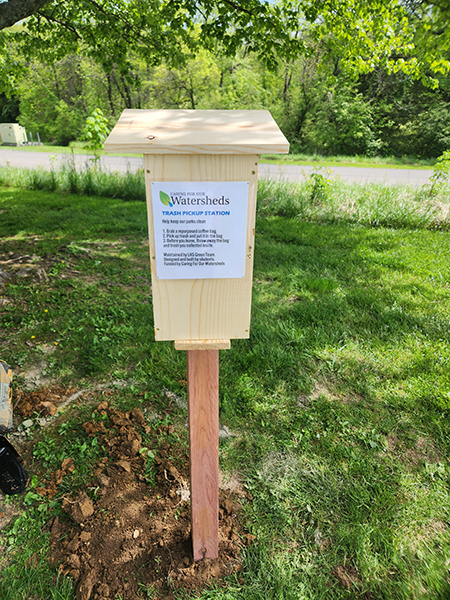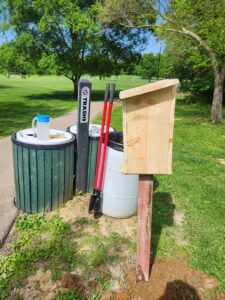2023, Loveland, Ohio, USA

Zachary and Ryan are both students at Loveland High School working to protect the Little Miami Watershed. For their project they conceptualized, planned, built, and installed 3 trash pickup stations at key locations of popular local parks with a lot of trash pollution. At these stations, members of the local community who spend time at the park will grab a container from inside as they enter, fill it with trash as they walk around the parks, and throw the bag away as they are leaving to remove this trash from the park on a regular basis. Additionally, by using repurposed coffee bags that would have otherwise been thrown out by local coffee shops as these containers, the group was able to simultaneously reduce the trash in their watershed and give these non-recyclable items another chance. Through the commitment of their school’s Green Team to maintain the project by checking in on the boxes and resupplying them with coffee bags as they are used up, even as the students move forward, the project will
continue serving their community far into the future.
The project addressed sustainable development targets 6.3 to “improve water quality by reducing pollution”, 14.1 to “prevent and significantly reduce marine pollution of all kinds”, and 15.1 to “ensure the conservation, restoration and sustainable use of terrestrial and inland freshwater ecosystems” by removing trash (and the dangerous toxins/microplastics associated with it) from the park that otherwise would pose a threat to the water quality, underwater life, and terrestrial life both in the park itself and downstream. Additionally, their project involved the “participation of local communities” as stated in target 6B. Every bit of trash removed by those attending the park, according to the students, is a small but important step towards reaching these development goals, and inspiring others to take the similar steps in their own backyard.
Throughout the last 6 months, Zachary and Ryan took the opportunity to help their watershed and created a solution that is simple, easy to maintain, and most importantly, effective. By coming up with a strong plan before moving forward, receiving the necessary support and permission from their local government for the project was not an issue. They learned about protecting our environment and its importance, developing and proposing realistic solutions, and collaborating with one’s own community to help work toward a future for everyone.

